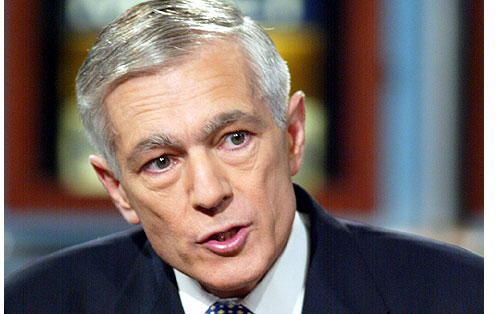
“‘As he’s said many times before, Senator Obama honors and respects Senator McCain’s service, and of course he rejects yesterday’s statement by General Clark,’ Obama spokesman Bill Burton said in a statement.” So…I guess Wes Clark won’t be the veep. For some ill-defined reason, the Obama campaign sees fit to throw the general under the bus because Clark, a guy I run hot and cold on, simply stated the obvious. Getting shot down over Vietnam, however ostensibly character-building, in no way constitutes executive experience: “I certainly honor his service as a prisoner of war. He was a hero to me and to hundreds of thousands and millions of others in the armed forces as a prisoner of war. And he has traveled all over the world. But he hasn’t held executive responsibility…I don’t think riding in a fighter plane and getting shot down is a qualification to be president.”
Said Obama in Independence today: “McCain had ‘endured physical torment in service to our country’ and ‘no one should ever devalue that service, especially for the sake of a political campaign, and that goes for supporters on both sides.’” Fair enough, but that wasn’t at all what Clark was doing. McCain’s basically getting away with the same sort of resume inflation as Sen. Clinton did in the primaries, and Clark — a five-star general who knows what he’s talking about — called him on it.
One could argue that there’s a method to this move by the Obama campaign, but even that theory suggests a certain ugly political opportunism at work. (One could also argue karma had some part to play in all this, since Clark earlier jumped all over Samantha Powers’ gaffe during the primaries.) Nonetheless, between this, the Senator’s switchback on telecom immunity (which I discussed in the comments here), and various other recent triangulations, the Obama campaign has had a pretty lousy week. I don’t know if it’s the recent influx of “veteran” hands, an attempt to beat back the National Journal liberal label, or just an early-summer malaise, but that sickly-sweet smell of Old-School Dem Politics is lingering in the air. Get it together, y’all. I know the polls look good, but this defensive-minded playing-not-to-lose is assuredly not the way to go.
Update: “I’ve said this for some weeks now, they’ve been repeated many times.” Clark sticks to his guns, and Webb has his back. Meanwhile, Salon‘s Glenn Greenwald makes the case against Obama’s last two weeks: “There is no question, at least to me, that having Obama beat McCain is vitally important…[but] his election is less likely, not more likely, the more homage he pays to these these tired, status-quo-perpetuating Beltway pieties.“
Update II: Obama clarifies on Clark: “I don’t think that General Clark you know had the same intent as the swift boat ads that we saw four years ago, I reject that analogy…I think in at least one publication was reported that my comments yesterday about Senator McCain were in a response to General Clark. I think my staff will confirm that that was in a draft of that speech that I had written two months ago.”
Update III: Fred Kaplan has a theory about Clark v. McCain: Grunts are from Mars, Flyboys are from Venus.

